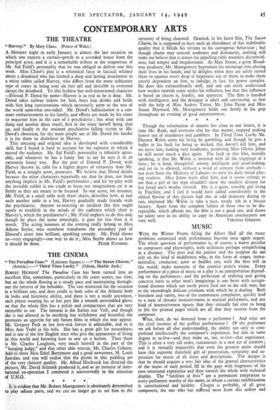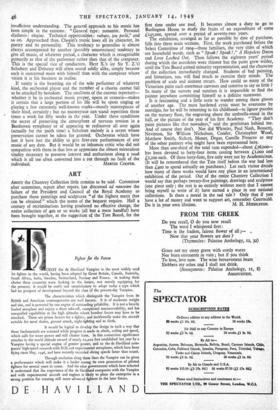MUSIC
WITH, the Winter Proms filling the Albert Hall all the many problems connected with performance become once 'again urgent. The whole question of performance is, of course, a worry peculiar to composers and playwrights, with architects perhaps sympathising at a distance. The poet and the painter and the sculptor do not rely on the kind of middlemen who, in the form of singer, instru- mentalist, conductor, actor or builder can, with the best will in the world, make nonsense of the creative artist's vision. Every performance of a piece of music or a play is an interpretation depend- ing on the performers ; and the profession of realising and giving concrete form to other men's imaginings is one beset with occupa- tional diseases which can easily prove fatal not to the sick man, but to the exceedingly delicate creations with which he is dealing. Both I boredom and vanity, two of the commonest complaints, quickly lead to a state of chronic insensitiveness in musical performers, and any kind of insensitiveness means that they virtually fail ever to bring to life the printed pages which are all that they receive from the composer.
What, then, do we demand from a performer ? And what are the chief enemies of the peffect performance ? Of the performer we ask before all else understanding, the ability not only to com- prehend intellectually the composer's experience, but also in some degree to re-live—and then make us, too, re-live—that experience. This is often a very tall order, tantamount to a new act of creation ; and it is virtually impossible that even the greatest artist should have this supreme threefold gift of penetration, sympathy and ex- pression for music of all dates and descriptions. The danger is that he should acquire a very fair idea of the general characteristics of the music of each period, fill in the gaps with fragments of his own emotional experience and then varnish the whole with technical display. The " futilities of brio " are a permanent temptation to every performer worthy of the name, in whom a certain exhibitionism is constitutional and healthy. Chopin is probably, of all great composers, the one who has suffered most from this ardent and insufficient understanding. The general approach to his music has been simple in the extreme. " General type : romantic. Personal diathesis : elegiac. Technical opportunities : rubato, jeu perle," and so on. Approached thus, Chopin's music loses all its character, its poetry and its personality. This tendency to generalise is almost always accompanied by another (possibly unconscious) tendency to give all music, of whatever period, a character which is recognisable primarily as that of the performer rather than that of the composer. This is the special vice of conductors. Herr X.'s (or Sir Y. Z.'s) Schubert and Debussy will often sound oddly alike, simply because each is concerned more with himself than with the composer whose vision it is his business to realise.
If vanity is the besetting sin of the solo performer of whatever kind, the orchestral player and the member of a chorus cannot fail to be attacked by boredom. The smallness of the current repertory— whether it be in orchestral music proper, opera or oratorio—makes it certain that a large portion of his life will be spent singing or playing a few extremely, well-known works—mostly masterpieces of their kind, certainly ; but no masterpiece can •stand repetition three times a week for fifty weeks in the year. Under these conditions the secret of preserving the atmosphere of nervous tension in a Beethoven symphony or of appearing to rediscover all over again (actually for the 300th time) a Schubert melody is a secret whose preservation cannot be taken for granted. Orchestras which have lost it have lost the ability to give first-rate performances of any music of any date. But it would be an inhuman critic who did not sympathise with them in that loss or appreciate the almost miraculous vitality necessary to preserve interest and enthusiasm along a road which is all too often converted into a rut through no fault of the



































 Previous page
Previous page